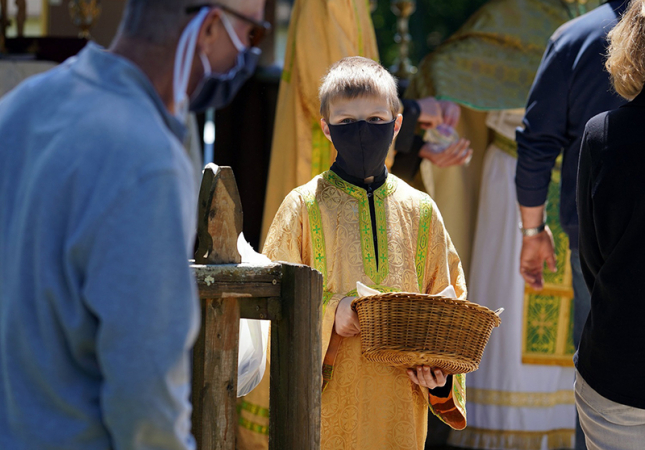
Altar server Liubiomyr Budash, 8, holds a collection basket following a Pentecost Divine Liturgy May 31, 2020, on the grounds of Resurrection Byzantine Catholic Church in Smithtown, N.Y. By giving of our material wealth, especially to those who are strangers, we are growing into our humanity as images of God. (CNS photo/Gregory A. Shemitz)
By: Brendan Gottschall, SJ
“Love ought to show itself more in deeds rather than words.” — St. Ignatius of Loyola
One of the basic things we do to express love is giving. Naturally, we give of our time, talents and treasure to our family and friends.
In this time of Lent, we are called to expand our horizons of love to those in need through almsgiving. By giving alms, we not only help the less fortunate, but we also grow in our own humanity.
Giving and receiving things is part of what it means to be a human being. None of us chose to exist. God’s creation is itself the primary gift.
From the very beginning, we are dependent on others for our basic needs. In God’s providence, the world is ordered so that other people, mostly people we will never meet, work to provide us with the goods and services we need to survive and thrive.
Although we usually compensate others for what they give us through the sweat of their brows, we must admit that everything we have can be traced back to the free gifts of God.
By giving of our material wealth, especially to those who are strangers, we are growing into our humanity as images of God. Almsgiving is a way of sharing in God’s work to sustain and support all his children.
Especially if, as the widow who gave her last two coins (Mk 12:41-44), we give out of our livelihood and not just our excess. Truly sacrificing for our neighbors, even those we have never met, is an imitation of Christ who gave his whole life for our sake.
Two temptations can inhibit our almsgiving: First, one might object that we ought to be teaching people to fish rather than giving them fish, that handouts only encourage people to beg and perpetuate a cycle of dependence.
There is truth in this sentiment: We have an obligation to advocate for social justice, defined as “the conditions that allow associations or individuals to obtain what is there due,” according to the Catechism of the Catholic Church (No. 1928). But the obligation to address structural injustices is only the minimal expression of the Christian vocation to love our neighbors.
Pope Benedict XVI wrote in the encyclical “Caritas in Veritate”: “Charity goes beyond justice, because to love is to give, to offer what is ‘mine’ to the other; but it never lacks justice.” Indeed, we cannot separate justice and charity or think of them as substitutes.
In his message for Lent 2018, Pope Francis has specifically called on Catholics to give to anyone who asks of us: “Even in our daily encounters with those who beg for our assistance, we (should) see such requests as coming from God himself.”
The second temptation is to make excuses like “the money I give might be wasted” or “I only want to give to those with whom I am in relationship so that I don’t undermine the humanity of those to whom I give.”
These temptations are especially real in a time when opportunities for almsgiving might be mostly online. There is a lack of connection with the recipient or human recognition for generosity.
Jesus reminds us that this is how God the Father gives to us: with no regard for how much we waste or condition that we recognize him as giver. “He makes his sun rise on the bad and the good, and causes rain to fall on the just and the unjust” (Mt 5:45).
This explanation comes only a few verses before Jesus’ teaching on almsgiving: “When you give alms, do not let your left hand know what your right is doing, so that your almsgiving may be secret. And your Father who sees in secret will repay you” (Mt 6:3-4).
The quotation from St. Ignatius above about loving in deeds comes from the final exercise in his “Spiritual Exercises.” Ignatius instructs the one making the exercise to recall all the gifts they have received: the natural gifts of creation, the supernatural gifts of redemption and the particular gifts that make each of us special.
After considering how much God has done for them, Ignatius anticipates that the prayer will move from gratitude to a desire to respond to God’s infinite generosity. What can we offer back to God? Simply put: ourselves.
Our material possessions are only a small part of who we are and what we have. But our money and time are essential parts of our existence that we can offer back to God by giving it away to our neighbors as alms. When we can let go of our own wants to fulfill the needs of others, we grow closer to God and grow in freedom.
Later on, in that same chapter of Matthew’s Gospel, the Lord gives us a beautiful image of the freedom that comes from trust in God: “Learn from the way the wildflowers grow. They do not work or spin. … If God so clothes the grass of the field, which grows today and is thrown in the oven tomorrow, will he not much more provide for you, O you of little faith?” (Mt 6:28-30).